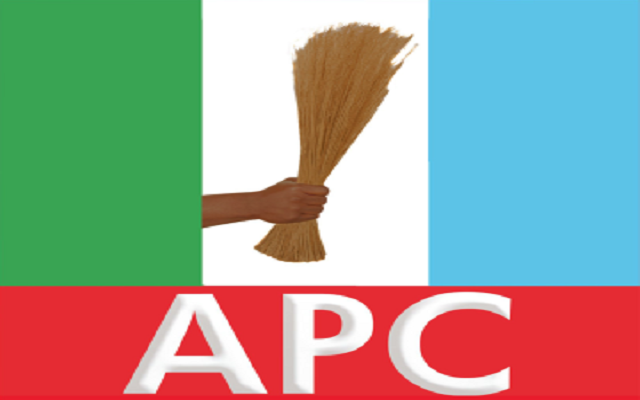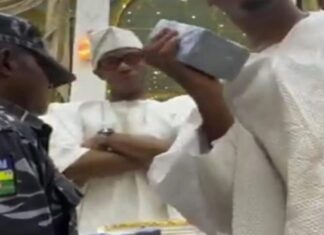By Emeka Alex Duru
There may, perhaps, be reasons in the dismissal of the ruling All Progressives Congress (APC) by critics as mere congregation of power-seeking politicians.
Those that hold this view further deride the party as not knowing what to do with power.
While facilitators of the party, largely drew membership from the then Action Congress of Nigeria (ACN), All Nigeria Peoples Party (ANPP), Congress for Progressive Change (CPC) and fragments of All Progressives Grand Alliance (APGA), in the build-up to the 2015 general elections, they had sold the impression of offering Nigerians an alternative platform for good governance.
Coming at a time the Peoples Democratic Party (PDP), which had been in power since the onset of the current democratic experiment in 1999, had obviously failed the country in many areas, not many actually probed the real agenda of the forces behind APC.
Of course, with a large dose of media hype and bogus claim to progressive politics, Nigerians who had been disappointed by the then President Goodluck Jonathan administration, easily bought into the flowery agenda of the party.
APC and governance agenda
In further enticing the voters, APC unfolded a roadmap that it claimed would serve as template in refocusing the nation. In what it presented as a 10-point agenda for a new Nigeria, the party listed areas it would focus on to make life meaningful if it got to power.
Highlights of the presentation included job creation; anti-corruption fight; free, relevant quality education; agriculture; housing plan; and healthcare plan for children and adults.
The party also listed social welfare scheme for the less-advantaged as well as road, power plant construction, among its priorities, adding that it would strengthen peace, security and foreign policy.
Riding on these people-oriented policy framework, coupled with the abysmal performance profile of the Jonathan administration, APC easily stole into the hearts of the Nigerian voters.
Building on Buhari phenomenon
To add it up, its presidential candidate, a former military dictator, albeit with enormous followership among the masses, was repackaged and presented to the voters as a born-again democrat.
It was thus, hardly surprising that in the March 28, 2015 presidential election, APC easily triumphed over the incumbent, the first of its kind in the country’s history. It also had a simple majority in both arms of the National Assembly (NASS). The party equally dislodged PDP in many states and legislative houses.
Victory mismanaged
The expectation was that with APC winning comfortably at the state and national levels, it would settle down for real governance. But its unexpected victory seems to have turned out its nemesis ever since.
The major signs of disorder in APC appeared on June 9, 2015, when the 8th National Assembly was inaugurated.
The legislators had defied the party leadership and selected leaders that were not proposed by APC leadership.
Contrary to Senator Ahmed Lawan and Femi Gbajabiamila, respectively, who the party leadership had anointed as Senate President and Speaker of the House of Representatives respectively, the legislators elected Senator Bukola Saraki and Yakubu Dogara, respectively.
APC did not take kindly to the matter. Promptly, the party vowed to get even with the Saraki, stressing that it would not accord his leadership of the NASS any form of recognition.
Though the President had before the NASS inauguration pledged not to interfere with the activities of the lawmakers but to work with any leadership selected by them, his subsequent actions indicated that he was on the same page with APC in not according Saraki the deserved recognition.
When, therefore, the Senate President was paraded before the Code of Conduct Bureau (CCB) and subsequently, Code of Conduct Tribunal (CCT) on allegation of improper declaration of assets, it was not difficult to see the hands of the APC and presidency in his ordeal.
The Senate president has however been discharged and acquitted by the Tribunal. Even at that, he is yet to be completely accorded his due in the party.
Compatriots as rivals
There are other chieftains of the party that are perceived to have been elbowed out of its decision making apparatus. Prominent among them are former Vice President, Atiku Abubakar, and erstwhile Lagos State governor, Bola Ahmed Tinubu. Given what has been seen as their exclusion in the affairs of the party, there have been occasional insinuations on their leaving the party.
They have however denied any agenda at leaving APC.
But Tinubu’s relations with the party’s leadership has remarkably been quite lukewarm at best. Not that he had been particularly seen to be comfortable with the affairs of the party since the 2015 electoral victory. But developments in the party lately have tended to portray him as more of an outsider.
A particular instance that his supporters readily cite is the party’s handling of the November 26, 2016 Ondo governorship election.
In the build-up to the poll, Tinubu had settled for Olusegun Abraham as his preferred candidate. At the primary, however, former Nigeria Bar Association (NBA) President, Oluwarotimi Akeredolu, emerged the winner in controversial circumstances. Electoral malpractices were alleged as aiding his victory.
Tinubu had looked up to the national secretariat of the party to respect his wish and order a fresh primary or declare Abraham the candidate.
But the National Chairman, John Odigie-Oyegun, who presided on an appeal by Abraham, upheld the result of the primary.
Tinubu did not find the situation funny. To worsen matters, Buhari looked the other way in a manner many suspected, meant an endorsement of Akeredolu, who eventually won the election.
That added to the insinuation of the former Lagos governor no longer being in the party with his body and soul.
Atiku is also seen to have been denied his due in the party, especially considering his huge financial commitment to it. In fact, at a recent event in Abuja, he lumped APC among the parties lacking in internal democracy. The rumour has thus been strong that the two, alongside like minds and their supporters, may be pulling out of the party any time.
In some quarters even, Saraki is being linked with the possibilities of leaving APC. Though his links with the move are not as thick as those of Atiku and Tinubu, it would not come as shock to observers if he turns his back at APC.
For one, he still has strong ties with some members of PDP. He is also not counted among the Buhari tendency in APC.
His recent statement that current developments in APC are contrary to what they had in mind while forming the party is being interpreted in some quarters as an indication of likely exit from the party. He has however denied any agenda in that direction.
Buhari and dwindling popularity profile
The uncertain developments at a time job performance profile of the President has been at an all-time low has been giving other members of the APC serious cause for concern.
The central issue, our reporter gathered, is what key members of the party discuss in hushed tones, as the know-all, headmaster carriage of Buhari.
“Look at the piteous state of the economy. He (the President) is not versed in the economy. He also does not want to allow his aides who understand the terrain to function. This is why we are on the same spot more than two years after coming to power. The way things are, I have fears if we can convince Nigerians to vote for us in 2019”, volunteered an obviously distraught former member of the House of Representatives from Lagos State, who asked not to be mentioned.
To compound matters, the President has not been in good state of health, lately.
In the last three months, for instance, he has been in London hospital for undisclosed ailment. His return date was uncertain by press time. He had been out earlier in March for medical attention from where he returned briefly after spending two months.
Resume, resign agitators on the prowl
On account of his absence which analysts attribute to near stagnancy in governance, agitations have been high on him to resume or resign.
On Monday, August 7, 2017, individuals and groups led by musician and public affairs analyst, Charles Oputa, a.ka, Charlie Boy, staged protest in Abuja, asking the President to return to office or resign.
The presidency, though admitting that the protesters were exercising their constitutional right, stated that they were making impossible requests. By Tuesday, the next day, reports indicated that the Police had pounced on the protesters.
State branches at war
While the uncertainty at the national level of the party widens, the state wings are equally at war. In Bayelsa, the crisis rocking the state chapter, eventually led to the expulsion of the suspended chairman, Tiwei Oruminighe, by the National Working Committee (NWC).
Tiwei was earlier suspended over alleged anti-party activities but went ahead to conduct the state delegates’ election in which 24 delegates were cleared for the party’s non-election national convention.
In Kano, the state executive of the party headed by Umar Haruna Doguwa has also been removed. The governor, Abdullahi Umar Ganduje, who explained Doguwa’s removal, accused him of financial misappropriation.
“He was impeached because he misappropriated party’s fund. He is a mischievous person and cannot be trusted as party man,” he said.
Lagos state is also encountering its own internal crisis following a running battle with the National Legal Adviser, Muiz Banire, over his allegation of imposition in the affairs of the party.
On account of his audacity, Banire, a former commissioner, was suspended by his Mushin Ward on allegation of anti-party activities. But a statement by the National Publicity Secretary, Bolaji Abdullahi, countered the action.
Danger ahead
Confronted with the unceasing crisis in the various organs of the party and copious inertia by the APC leadership, there have been pronounced fears by members on the party going the way of PDP, before 2015. PDP, while in power, at a time, got carried away by the glamour of authority that it easily yielded to the culture of impunity and arrogance in the conduct of its affairs.
It took a shocking loss to APC in 2015 for the party to be humbled. Ever since, it has been struggling to get its acts together. A 14-month leadership tussle between Borno State former governor, Ali Modu Sheriff, and Kaduna State former governor, Ahmed Makarfi, almost tore the party to shreds. But with a Supreme Court verdict of last month that returned authority to the Makarfi mainstream leadership of the party, PDP has been on an agenda to reposition itself in the mind of the voters. It has confessed learning from its mistakes while in power and has pledged making amends if given another chance.
Concerned APC members have confirmed their fears at the climate of reason that seems to prevail in PDP. They fear that with APC not having much to brandish in terms of democracy dividends to the people, the party will be stunned with protest votes in 2019 general elections.













